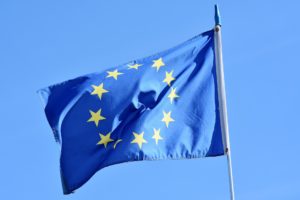Highlights from the Past Weeks
CW 9 / Monday, 27 February to Thursday, 2 March: Committee Meeting Week (Brussels);
ARTIFICIAL INTELLIGENCE – TWO OR THREE MORE WEEKS: The shadow rapporteur meeting on the AI Bill, scheduled for the first week of March, has been postponed for a week to allow the technical work to progress. While co-rapporteur Brando Benifei tried to assure last week that a political agreement was within reach, some parliamentary officials are beginning to believe that the negotiations could drag on much longer if no agreement is reached by the end of March. New compromise proposals were sent out on batches #7, #8, #9, #10 and #11.
Technical standards and conformity assessment are on the agenda of the next technical meetings. The big issue that EU legislators have not yet addressed is general AI (see Euractiv).
DIGITAL SERVICES ACT – COMMISSION DEFINES SUPERVISORY FEES: The Commission has adopted the draft rules and procedures for the levying of supervisory charges on very large online platforms (VLOPs) under the DSA. The delegated act adopted by the EU executive last week implements the provision of the DSA that allows the Commission to levy such charges on all service providers that fall under its jurisdiction. The fees should not exceed 0.05 percent per year of a company’s global net revenue in the previous year. The Parliament and the Council now have at least three months to consider the law.
DATA ACT – GENERAL ORIENTATION NEEDS ANOTHER ROUND: The Swedish Presidency will present a sixth compromise on the data law. In this context, the measures of the previous version on trade secrets and B2G data exchange turn out to be the most important issues still open. It is expected that the text will be discussed in the Telecommunications Working Group meeting on 14 March with a view to sending it to Coreper as early as 30 March (see Euractiv).
In Parliament, the vote on the ITRE report (PDF) is scheduled for the next Strasbourg session week from 13 to 16 March.
DATA PRIVACY FRAMEWORK – EDPB SEES IMPROVEMENT TO PRIVACY SHIELD: The European Data Protection Board (EDPB) raised several concerns that should be addressed in order for the new EU-US data protection framework to stand. In its non-binding opinion, the committee noted that the new agreement was an improvement over the Privacy Shield. However, they stressed that the restrictions on data collection by US security agencies and the legal remedies should stand in practice and not just on paper. European data protection authorities also called for more clarity on temporary bulk collection, onward transfers, and the lack of automated decision-making and profiling rules. The EDPB also requires that the adequacy decision be reviewed every three years (see Euractiv).
CSAM – INTERNAL MARKET COMMITTEE DISCUSSES OPINION: Last week, the European Parliament’s Internal Market Committee (IMCO) held the discussion on the draft report on the Directive on the Prevention of Online Child Abuse Material (CSAM). The shadow rapporteurs both praised and criticised the statement by A. Agius Saliba (S&D, MT). M. Walsmann (EPP, DE) welcomed, e.g., the clarifications on hotlines while criticising the deletion of measures against grooming and new content. C. Rinzema (Renew, NL) expressed regret at the deletion of age verification for app stores but welcomed the clarifications on encryption. M. Kolaja (Greens, CZ) also underlined the importance of encryption. Both Rinzema and Walsmann also spoke out in favour of voluntary measures by the providers. (Video from 10:00)
FREEDOM OF THE MEDIA I – COUNCIL WANTS STRONGER ROLE FOR STATES: The latest compromise proposal of 27 February (PDF) of the Swedish Council Presidency was discussed in the working group last week. In it, the Presidency takes small steps with regard to the personalisation of media services (Article 19), national measures affecting media activities (Article 20) and merger control (Articles 21 and 22). With regard to the control of national measures affecting media services, this first compromise gives way to states being able to settle disputes in court (without having to involve another instance). The opinion of the future Media Council may be sought on a national measure which “significantly” affects the activities of media services (seeContexte, Paywall, FR).
FREEDOM OF THE MEDIA II – PARLIAMENT CONSIDERS SPLITTING IT UP: According to a media report (see Contexte, paywall, FR), rapporteur Sabine Verheyen (EPP, DE) is thinking about separating the articles that fall under the competence of the individual Member States from the rest of the regulation. This includes Article 5 on public service media. The news comes at a time when calls are growing louder, especially in Germany, for the regulation to be converted in whole or in part into a directive. According to a still half-baked working approach, this specific part could force the national implementation of the articles in question.
The Parliament’s Legal Service will be consulted on these ideas. The idea of this special section was raised at the Commission and stakeholder hearings held by Sabine Verheyen on 27 and 28 February. She has one month to prepare her draft report, which is due on 31 March.
CYBER RESILIENCE – PARLIAMENT STARTS WORK: The EU Parliament has started its work on the Cyber Resilience Act (CRA) with an exchange of views with the Commission in the Internal Market Committee (IMCO). Although the jurisdictional dispute has not yet been decided, the IMCO has published its timetable (PDF) and officially acknowledged that the Industry Committee (ITRE) will retain the lead. The deadline for tabling amendments has been set for 26 April, immediately after the draft opinion has been examined, and the committee vote is scheduled for the end of June. The question of which exclusive responsibilities IMCO will receive is still open.
Meanwhile, ITRE Rapporteur Nicola Danti held his second stakeholder workshop on the CRA. Invitees included Apple, manufacturers’ associations, the European Consumer Organisation (BEUC), Privacy International and the cybersecurity company Trellix (see Euractiv).
CYBERSECURITY – NEW SECURITY PACKAGE AT THE BEGINNING OF APRIL: The cyber solidarity initiative, mentioned by Thierry Breton in December, aims to “develop synergies” between cyber defence and cyber security, including in the private sector, and to establish a “cyber reserve” that can be mobilised quickly to intervene in the EU.
As the latest draft of the Commission’s timetable shows, the package is expected on 5 April. It will consist of the Cyber Solidarity Act and the Academy for Cyber Skills. The Cyber Academy initiative is non-legislative, according to the Commission’s 2023 Work Programme.
The legislative proposal aims to provide the legal framework for critical entities identified under NIS2 to access a cybersecurity contingency fund in response to large-scale cyberattacks and to prevent, for example, penetration testing or bug hunting (see Contexte, paywall, FR as well as Euractiv).
INFRASTRUCTURE – THE RESPONSE OF THE MEMBER STATES: The Netherlands was the first to criticise the Commission’s proposal openly, saying the plan could harm European consumers and businesses and hinder digitalisation in the region. The country also accused the telecom companies of “omitting crucial information, leading to a misrepresentation of the facts”.
The German State Secretary for Digital Affairs, Stefan Schnorr, also criticised the initiative at a hearing in the German parliament, the Bundestag, saying he found the Commission’s questionnaire “slightly tendentious”. Ben Brake, head of the Digital and Data Policy Department at the German Federal Ministry for Digital and Transport (BMDV), criticised Breton on Twitter and accused him of having already formed his opinion before the consultation.
The EU executive will present its connectivity package next week in the Telecommunications Working Group, which also includes the consultation on “fair share”. Although it is too early for the Member States to take a clear position, it could provide interesting clues to the different positions (see Euractiv).
DIGITAL MARKETS ACT – INTEROPERABILITY IN MESSENGERS: Last week, the Commission’s second stakeholder workshop on the implementation of the DMA took place and focused on the interoperability of messenger services. Stakeholders proposed several technical solutions and language models to ensure vertical and horizontal interoperability of messaging services and looked in particular at the technical aspects of the progressive implementation of the DMA’s obligations in this area. The decision on which technical standard to use lies with the European Commission (see Euractiv).
“We have not found a solution to the question. But we know that, in principle, interoperability is possible,” said Andreas Schwab (EPP) when reporting on the first DMA working group of the Parliament’s Internal Market Committee last week. He concluded his message with: “We will now follow up on how this idea, when the gatekeepers are appropriately defined and designated, will be implemented” (video from 9:11).
Messenger interoperability is one of the big commitments in the DMA. The technical modalities were explained in a series of technical workshops held by the Commission.
DIGITAL SERVICES ACT – COMMISSION DEFINES SUPERVISORY FEES: The Delegated Regulation is intended to provide legal certainty to service providers designated as Very Large Online Platforms (VLOPs) or Very Large Online Search Engines (VLOSEs) under the Digital Services Act (DSA).
The Commission’s decision last week follows a public consultation that took place between 22 December 2022 and 19 January 2023. If the European Parliament and the Council of the EU do not object within three months, the delegated regulation will enter into force.
The Commission’s proposal provides further details on the calculation of the estimated total costs and the determination of the individual fees and sets out the procedure for the overall cap (see press release COM).
POLITICAL ONLINE ADVERTISING – FIRST TRILOGUE ROUND COMPLETED: The first political trilogue on the regulation took place last week. Afterwards, the Chair of the Internal Market Committee (IMCO), Anna Cavazzini (Greens), explained in detail the priorities of the Parliament, which were presented by the rapporteur Sandro Gozi (Renew). (Video)
An initial four-column document (PDF) detailing the text was distributed in advance of the trilogue. The second political trilogue is expected at the end of March and the aim is to reach an agreement by June.
CHIPS ACT – TRILOGUE PROCEDURE STARTED: After the first meeting of negotiators last week, a timetable was set for the trilogue on the chips bill. The next political meeting is scheduled for 9 March, with follow-up meetings planned for 30 March, 4 May and 5 June (see Euractiv).
EPRIVACY – LESS TALK ABOUT THE REGULATION: This is not the first time that the question of a possible end to the ePrivacy Regulation has been raised.
But despite the announcement in their programme to continue work on the ePrivacy Regulation, Stockholm has given priority to other dossiers. The Parliament’s rapporteur, Birgit Sippel, criticised the Council Presidency’s lack of interest in the dossier on Twitter last week.
According to a report by Euractiv, a growing number of EU Member States believe that the ePrivacy proposal is dead and that the Commission should withdraw it and propose something new.
GERMANY – DNS RESOLVER CONVICTED OF COPYRIGHT INFRINGEMENT: Sony won a victory at the Leipzig Regional Court on 1 March in the highly publicised case against the Swiss Quad9 Foundation (Ref: 05 O 807/22). The court ruled that the provisions of the German Telemedia Act (TMG) and the associated liability privilege did not apply because a DNS resolver was not a service provider. The court also did not recognise an incidence of “Stoererhaftung” (interference liability), which had been assumed in the preliminary injunction proceedings, but found Quad9 to be a party to the offence.
Quad9 has now announced that it will appeal against the ruling. eco is backing Quad9 in these proceedings. The non-profit foundation is asking for donations via https://quad9.net/donate (see press release eco and Golem, DE).
GERMANY – GERMAN FEDERAL NETWORK AGENCY (BNetzA) PUBLISHES LIST ON SANCTIONS REGULATION: Last week, the German Federal Network Agency informed about a possible update of the domains that can be blocked without sanctions due to the EU Sanctions Regulation. In the course of this, a German-language publicly accessible list (PDF) of the current domains was also published, which can be accessed via the BNetzA’s page, bundesnetzagentur.de/dns-sperren (DE).
Relevant Publications, including from the EP Think Tank:
- VAT in the digital age (Briefing)
- Women in the digital sector (At a Glance)
Selected consultations of the EU Commission
- Further clarification of the procedural rules for the enforcement of the General Data Protection Regulation – Call for Evidence: 24 February – 24 March 2023
- The future of the electronic communications sector and its infrastructure – Consultation: 23 February – 19 March 2023
- Digital Services Act – Implementing Regulation – Feedback on IR: 16 February – 16 March 2023
- Strategic Foresight 2023 – Call for Evidence: 13 February – 13 March 2023
- New product priorities in Ecodesign for Sustainable Products – Call for Evidence: 31 January to 12 May 2023
- VAT in the digital age – feedback on the ordinance: 8 January 2022 until 4 April 2023
Outlook for the Current Week
You can find a list of the upcoming dates of the European Parliament here.
The meeting calendar for 2023 is available here (PDF).
You can find an overview of the most important dates of the week of the Council here or the meeting calendar here.
The official calendar as well as the programme of the Swedish Presidency can be found on the corresponding website.
Among the dates are:
Summits and Ministerial Meetings:
- Education, Youth, Culture and Sport Council, Tuesday, 7 March – Agenda, A items, A items Addendum 1;
- Informal Meeting of Defence Ministers, Tuesday, 7 and Wednesday, 8 March – Programme;
- Informal Meeting of Development Ministers, Wednesday, 8 and Thursday, 9 March – Programme;
- Justice and Home Affairs Council, Thursday, 9 and Friday, 10 March – Agenda, A items;
- Informal Meeting of Trade Ministers, Thursday, 9 and Friday, 10 March – Programme;
Preparatory Bodies:
- Working Party on Competitiveness and Growth (Internal Market) (including Ecodesign, SMEI), Monday, 6 March (Agenda), Thursday, 9 March (Agenda) and Friday, 10 March (Agenda);
- Working Party on Telecommunications and Information Society (including GIA), Tuesday, 7 March (Agenda);
- Horizontal Working Party Hybrid Threats, Tuesday, 7 March;
- Working Party on Consumer Protection and Information, Wednesday, 8 March (Agenda);
- Horizontal Working Party on Cyber Issues, Wednesday, 8 March and Friday, 10 March;
- Working Party on Tax Issues (Indirect Taxation) (including VAT in the Digital Age), Thursday 9 and Friday 10 March (Agenda);
- Coreper I (including RED, EED), Wednesday, 8 and Friday, 10 March;
- Coreper II, Wednesday, 8 March;
Information about the weekly Commission meeting can be found on the website of the Commission in the preview (PDF) or (at short notice) in the current agenda. The recommendation on piracy in online live sporting events is expected on 26 April.
The following topics are on the agenda for this week:
- Road safety package
The judicial calendar of the ECJ can be found here.
European Parliament Committees
CW 10 / Monday, 6 to Thursday, 9 March: Political Group and Committee Meeting Week (Brussels);
LIBE Committee (Civil Liberties)
Current Meetings
- none
Further Meetings (calendar)
- Wednesday, 22 March, 9.00-12.30 and 14.30-18.30 (Brussels)
- Thursday, 23 March, 9.00-12.30 (Brussels)
JURI Committee (Legal)
Current Meetings
- none
Further Meetings (calendar)
- Monday, 20 March, 15.00-18.30 (Brussels)
- Tuesday, 21 March, 9.00-12.30 and 14.30-18.30 (Brussels)
Dossiers Timetable (2 February 2023)
ITRE Committee (Industry)
Current Meetings
- Thursday, 9 March (Brussels)
Further Meetings (calendar)
- open
Dossiers Timetable (16 February 2023)
IMCO Committee (Single Market)
Current Meetings
- none
Further Meetings (calendar)
- Monday, 27 March, 15.00-18.30 (Brussels)
- Tuesday, 28 March, 9.00-12.30 and 14.30-18.30 (Brussels)
Dossiers Timetable (January 2023)
CULT Committee (Culture)
Current Meetings
- none
Further Meetings (calendar)
- Monday, 27 March, 14.30-18.30 (Brussels)
- Tuesday, 28 March, 9.00-12.30 and 14.30-18.30 (Brussels)
PEGA Committee (Pegasus Investigation Committee)
Current Meetings
- Thursday, 9 March, 9.00-12.30 (Brussels)
Extract from the provisional agenda
…
- Proposal for a recommendation of the European Parliament of the Investigation of alleged contraventions and maladministration in the application of Union law in relation to the use of Pegasus and equivalent surveillance spyware
PEGA/9/11041
| Rapporteur: | |||
| Sophia in ‘t Veld (Renew) | RD – PE740.554v01-00 AM – PE742.485v01-00 AM – PE742.486v01-00 |
||
| Responsible: | |||
| PEGA | |||
- Consideration of amendments
- Deadline for tabling amendments:10 February 2023, 18.00
- Exchange of views on a European Security Lab / Research centre on spyware
…
Further Meetings
- Thursday, 16 March, 9.00-12.00 (Strasbourg)
INGE2 Committee (Special Committee on Foreign Interference)
Current Meetings
- none
Further Meetings (calendar)
- Tuesday, 21 March, 9.00-12.30 (Brussels)
Further Parliamentary Calendar Dates
- CW 11 / Monday, 13 to Thursday, 16 March: Plenary Session Week (Strasbourg);
- CW 12 / Monday, 20 to Thursday, 23 March: Committee Meeting Week (Brussels);
- CW 13 / Monday, 27 to Thursday, 30 March: Mini-Plenary Session Week (Brussels);




